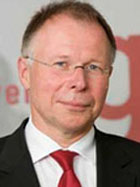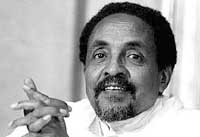Blogs
President of ATSAF introduces controversial issues at Tropentag
Tue, 10/04/2011 - 16:07 — De-Registered User
With only one day to go, Professor Dr Asch, president of ATSAF, is looking forward to the event that can be seen as a ‘hub of discussion’. ‘We can cause shifting paradigms’.
The German based organization ATSAF, the Council for Tropical and Subtropical Agricultural Research, is organizing the Tropentag this year and combines the expertise of development oriented agriculture research in the tropics and subtropics.
With ‘people on the margin’ as a central theme of the Tropentag 2011, there are a lot of scientific issues that will stir up the debate and may be controversial. Asch: ‘I’m pretty sure that we will have a lot of interesting keynotes and discussions at the conference. How to empower people who are marginalized through globalization, climate change, food insecurity and life style, such as the nomadic ethnical groups? This will be an important discussion point.’
Food insecurity
But there is more, according to Asch. ‘The debate about bio energy versus food will be controversial. Furthermore, there is a whole discussion going on about what the meaning is of food insecurity. Do we have to go to local smallholder decentralized systems or do we have to emphasis large production units? What are the benefits and constraints?’
Use your opportunity to shine!
Tue, 10/04/2011 - 15:51 — De-Registered User International conferences, like Tropentag, are excellent platforms for scientific knowledge exchange, networking, and for talented new professionals to present themselves. At least this is the experience of Dr. Barbara Ramsperger, the Executive Manager of the center for Agriculture in the Tropics and Subtropics of the Univesity of Hohenheim. This experienced researcher also has advice for new and ambitious researchers:
- If you have a poster, show what you have already done with confidence. Exploit your 3 minutes of fame!
- Be proactive and don’t be afraid to approach people and talk to them
- Participate in the conference activities that you’re interested in.
Environmental issues in tropical countries have different dimensions: There are many researchers working with these issues from different perspectives, such as poverty and development. Tropentag brings together Universities, researchers, students, NGOs and other institutions and allows them to share their knowledge in several poster sessions, oral presentation, plenery sessions and social events.
International conferences, like Tropentag, are excellent platforms for scientific knowledge exchange, networking, and for talented new professionals to present themselves. At least this is the experience of Dr. Barbara Ramsperger, the Executive Manager of the center for Agriculture in the Tropics and Subtropics of the Univesity of Hohenheim. This experienced researcher also has advice for new and ambitious researchers:
- If you have a poster, show what you have already done with confidence. Exploit your 3 minutes of fame!
- Be proactive and don’t be afraid to approach people and talk to them
- Participate in the conference activities that you’re interested in.
Environmental issues in tropical countries have different dimensions: There are many researchers working with these issues from different perspectives, such as poverty and development. Tropentag brings together Universities, researchers, students, NGOs and other institutions and allows them to share their knowledge in several poster sessions, oral presentation, plenery sessions and social events.
Tropentag 2011: The Final Countdown
Tue, 10/04/2011 - 13:59 — De-Registered User
In less than 24 hours Tropentag 2011 in Bonn will begin. This event is not only interesting for well-known speakers, but it’s also a unique opportunity for young scientists to present their research and meet with people from all over the world. This event will be covered by a group of 12 selected students of 11 different nationalities and 10 European universities.
Last weekend, all student reporters arrived from different corners of Europe to attain two days of training session at the University of Hohenheim. After workshops such as ‘journalism ethics and standards’ and ‘how to catch attention’ by Mr. Florian Klebs from the Press Office of Hohenheim University, we got an introduction of the use of social media and trained on reporting skills.
The next coming days, we will keep you updated on all the most important activities and outcomes of Tropentag 2011. What are the controversial issues around themes such as food security, biodiversity, climate change and development on the margin? We will help you to find out!
You can read our blogs, watch our videos and look at the photographs that will be published on this website and social media. So follow us on Twitter and Facebook!
We are ready, are you?
Tropentag 2011 is just a month away...
Sun, 09/04/2011 - 16:45 — De-Registered User
With 1098 registered participants from 72 countries, Tropentag 2011 is just a month away. A team of Student Reporters will be present to document in real time this year's 513 accepted contributions (117 paper presentation and 396 posters). Get a glimpse to the hosting University of Bonn and the City of Bonn.
Meet the Speakers: Dr. Hans-Joachim Preuß
Wed, 07/13/2011 - 18:31 — De-Registered User Hans-Joachim Preuß is the Managing Director of the Deutsche Gesellschaft für Internationale Zusammenarbeit (GIZ). He holds a PhD from
Justus Liebig University in Giessen, under the topic of target group-oriented agricultural research in developing countries.
Dr. Preuß started his professional career in development cooperation at the GTZ, holding various positions in Africa and at the GTZ Head Office in Eschborn, also as a member of the Corporate Development Unit. He was transferred at Welthungerhilfe in Bonn, where he was initially in charge of the Programmes and Projects Department and later Secretary General and Managing Director. In 2009, Dr Preuß was appointed Managing Director of GTZ.
Hans-Joachim Preuß is the Managing Director of the Deutsche Gesellschaft für Internationale Zusammenarbeit (GIZ). He holds a PhD from
Justus Liebig University in Giessen, under the topic of target group-oriented agricultural research in developing countries.
Dr. Preuß started his professional career in development cooperation at the GTZ, holding various positions in Africa and at the GTZ Head Office in Eschborn, also as a member of the Corporate Development Unit. He was transferred at Welthungerhilfe in Bonn, where he was initially in charge of the Programmes and Projects Department and later Secretary General and Managing Director. In 2009, Dr Preuß was appointed Managing Director of GTZ.
Meet the Speakers: Dr. Carla Roncoli
Tue, 07/05/2011 - 16:27 — De-Registered User Carla Roncoli is an economic-environmental anthropologist and member of the Center for Research on Environmental Decisions, Columbia University. She is currently Adjunct Faculty at Emory University and formely an Adjunct Professor in Anthropology at the University of Georgia.
She has worked with UNICEF in Nepal and Chad and consulted for numerous development organizations and International Agricultural Research Centers (IARCs). Dr. Roncoli’s research addresses the human dimension of climate change, with a particular focus on risk perceptions, communication, and management among African rural communities. It emphasizes the need for achieving a good “fit” between scientific information and technological innovations on the one hand and local knowledge, capabilities, and experience on the other hand.
Carla Roncoli is an economic-environmental anthropologist and member of the Center for Research on Environmental Decisions, Columbia University. She is currently Adjunct Faculty at Emory University and formely an Adjunct Professor in Anthropology at the University of Georgia.
She has worked with UNICEF in Nepal and Chad and consulted for numerous development organizations and International Agricultural Research Centers (IARCs). Dr. Roncoli’s research addresses the human dimension of climate change, with a particular focus on risk perceptions, communication, and management among African rural communities. It emphasizes the need for achieving a good “fit” between scientific information and technological innovations on the one hand and local knowledge, capabilities, and experience on the other hand.
Meet the Speakers: Prof. Paul Richards
Mon, 06/20/2011 - 10:28 — De-Registered User Paul Richards is currently Professor of Technology and Agrarian Development at Wageningen University, The Netherlands. He was a member of the Department of Anthropology at the University College of London (UCL) for 20 years from 1979 (Head of Department 1989-1992, Professor from 1992). While in UCL, he specialised in ecological anthropology, technology studies and West African ethnography.
His main fieldwork focus was on Sierra Leone, and included studies of Mende village rice farming systems and forest conservation on the Liberian border. He continued to work on and in Sierra Leone during the period of the civil war (1992-2002) and has written extensively on that conflict, and on the anthropology of modern armed conflicts more generally.
Paul Richards is currently Professor of Technology and Agrarian Development at Wageningen University, The Netherlands. He was a member of the Department of Anthropology at the University College of London (UCL) for 20 years from 1979 (Head of Department 1989-1992, Professor from 1992). While in UCL, he specialised in ecological anthropology, technology studies and West African ethnography.
His main fieldwork focus was on Sierra Leone, and included studies of Mende village rice farming systems and forest conservation on the Liberian border. He continued to work on and in Sierra Leone during the period of the civil war (1992-2002) and has written extensively on that conflict, and on the anthropology of modern armed conflicts more generally.
Meet the Speakers: Dr. Tewolde Berhan Gebre Egziabher
Sun, 06/12/2011 - 06:00 — De-Registered User Dr. Tewolde Berhan Gebre Egziabher is Director General of the Ethiopian Environmental Protection Authority and Councillor at the World Future Council.
He received his PhD in 1969 and is Ethiopia’s first plant ecologist. Most of his working life has been in academia, and he has been the Dean of Science at Addis Ababa University and President of Asmara University.
He also served as Director of the Ethiopian Conservation Strategy Secretariat.
During the 1990s Dr. Egziabher put much of his energy into negotiations at the various biodiversity-related fora, especially the Convention on Biological Diversity (CBD) and the FAO. During this time, he built up a strong group of well-prepared African negotiators who began to take the lead in the G77 and China Group. Africa came out with united, progressive positions such as no patents on living materials and the recognition of community rights.
Dr. Tewolde Berhan Gebre Egziabher is Director General of the Ethiopian Environmental Protection Authority and Councillor at the World Future Council.
He received his PhD in 1969 and is Ethiopia’s first plant ecologist. Most of his working life has been in academia, and he has been the Dean of Science at Addis Ababa University and President of Asmara University.
He also served as Director of the Ethiopian Conservation Strategy Secretariat.
During the 1990s Dr. Egziabher put much of his energy into negotiations at the various biodiversity-related fora, especially the Convention on Biological Diversity (CBD) and the FAO. During this time, he built up a strong group of well-prepared African negotiators who began to take the lead in the G77 and China Group. Africa came out with united, progressive positions such as no patents on living materials and the recognition of community rights.




